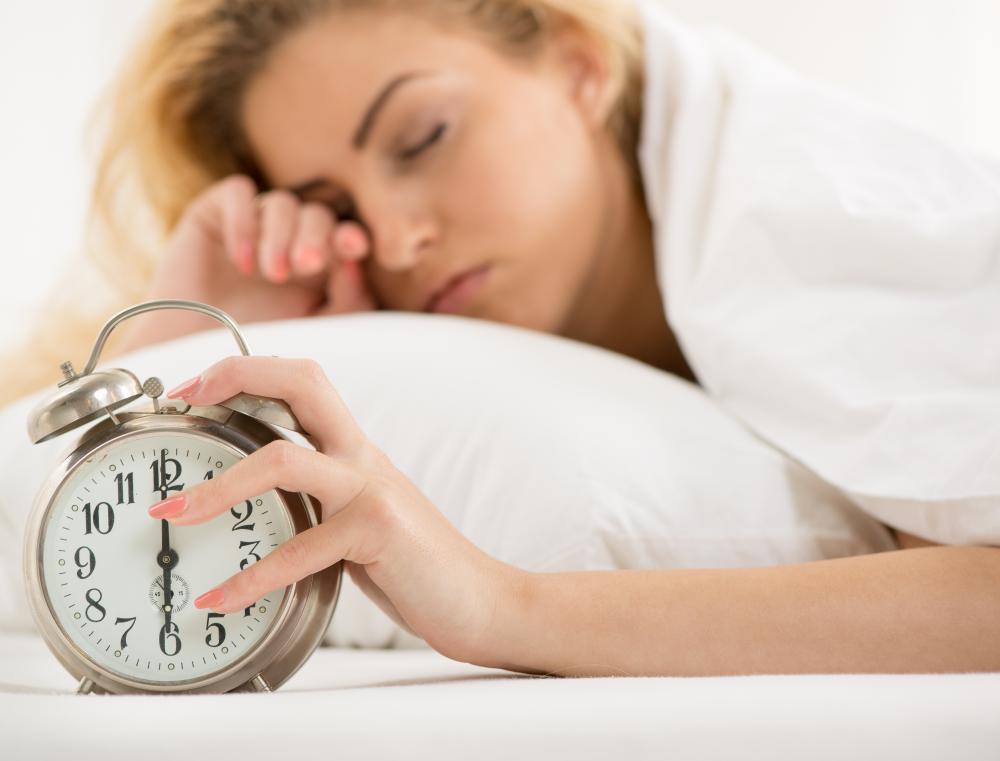At WiseGEEK, we're committed to delivering accurate, trustworthy information. Our expert-authored content is rigorously fact-checked and sourced from credible authorities. Discover how we uphold the highest standards in providing you with reliable knowledge.
What are the Different Sleeping Paralysis Symptoms?
Sleeping paralysis symptoms typically occur just as a person is either waking up or falling asleep. People who experience sleep paralysis normally report being conscious but unable to move or speak, just as if they were paralyzed. There are also people who report feeling as though they are in great danger during sleep paralysis episodes, often from some unseen evil force that they feel certain is in the room with them. This sense of evil people describe feeling is most likely a panic response to not being able to move or speak. Most people experience sleeping paralysis symptoms for no more than a few seconds to a few minutes before the sensation ends.
Statistics state that approximately four out of every ten people will experience sleep paralysis symptoms at some point in their lives. The problem is rarely ever a chronic one, and most people experience it only occasionally. Sleep paralysis is also not considered to be either dangerous or life-threatening. Doctors say that sleep paralysis most likely occurs when people are not passing through the various stages of sleep properly and their minds become alert before their bodies do. People almost never need medical help for sleep paralysis, although a doctor should be consulted if sleeping paralysis symptoms are occurring so often that a person's sleep is continually interrupted.

There are two different types of sleep paralysis. The first type, called hypnagogic, occurs during the process of falling asleep. Hypnopompic sleep paralysis occurs when the body is waking itself up from sleep. The sleeping paralysis symptoms of both types of sleep paralysis are identical. People who have narcolepsy, which is a disorder that prevents the brain from being able to regulate sleep, tend to experience both types of sleep paralysis more often than people who are not affected by narcolepsy.

Even though sleep paralysis is rarely ever a serious problem, there are some things that may prevent it from occurring. Research suggests that people who regularly sleep on their backs tend to experience sleep paralysis more often than people who sleep in other positions. Sleep paralysis might also occur more often in people who do not get enough sleep. A person who frequently experiences sleep paralysis may want to try sleeping in different positions along with making an effort to get more sleep to help avoid the problem. Anyone who often experiences sleep paralysis in addition to finding himself or herself going to sleep at odd times throughout the day with no warning might be narcoleptic and should seek medical attention.
AS FEATURED ON:
AS FEATURED ON:















Discussion Comments
@Feryll - When I read this article I get the understanding that the sleep disorder that causes sleep paralysis is rooted in some physical action in the body. However, the paralysis dreams where you can't move are believed to be associated with a fear you have in your real life.
For example, you may be trying to make a decision, choose between two options, and you are afraid to choose. This inability to choose is a form of figurative paralysis that is played out in your dreams.
This happens to me all of the time, but I didn't know sleep disorder paralysis was the name for this condition. The article says that sleeping on your back could be one thing that causes this to happen. For me, that might be the problem because I sleep on my back most of the time.
When this happens, I wake up, and it seems like maybe something or someone is in my room and made a noise and woke me. Even after I am physically able to move, I lie there for a couple of minutes without moving to make sure nothing is in the room with me.
This has happened enough to me that it doesn't bother me too much now, but I am going to try to sleep on my stomach or side and see if that makes a difference.
I have never experienced sleep paralysis, but I overheard some people at work talking about this the other day. This seems to be a relatively common thing for people to have happen to them at least once in a lifetime.
The closest situation that compares to sleeping paralysis that I can think of that has happened to me is I sometimes have dreams where I am trying to run away from some danger, and I can't move. This is frightening enough. If I knew I was awake and I could not move my body then I think that would be even more frightening than the dream.
Post your comments